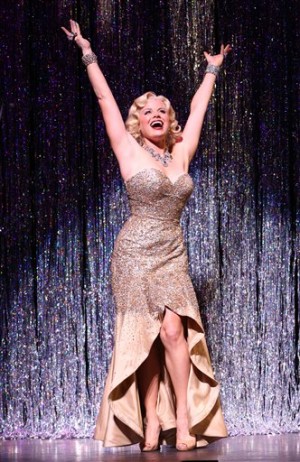I was just thinking to myself that I couldn’t believe January is over already before my thought process segued to me wondering when I turned into my parents. But we’re already a month into 2012 and so much has been going on.
Today, incidentally, is Carol Channing’s 91st birthday. I was lucky enough to attend a preview screening of the new documentary Carol Channing: Larger than Life this summer at Tavern on the Green with SarahB, and was fortunate to receive an invite to a press screening this month. Dori Berinstein’s new film is a love letter to the Tony-winning star most famous for her roles as Lorelei Lee and Dolly Levi. Running 87 minutes, the film focuses on Carol’s extraordinary discipline and professionalism, her current project to get arts back into public schools and her late-in-life reunion with middle school sweetheart Harry Kullijian, Channing’s third husband.
The film is highly entertaining, featuring clips from her various TV and stage appearances, with that larger than life persona out on full display. Her dedication to her career, the commitment to her public persona has endeared her to audiences for 60 years, so it was interesting to hear others talk about her, including JoAnn Worley, Lily Tomlin, Barbara Walters and Tyne Daly (to name a few). Amid the laughs, the film hints at the difficulties in her life, most notably her battle with ovarian cancer, but doesn’t delve as deep as one would hope. Still, for fans, this is a must-see with many laughs along the way. The scenes revolving around Carol and Harry’s reunion have taken on a deeper poignancy, since Harry’s death last month and are quite moving as a result.
Celebrating under-appreciated musicals is something I do well, and enjoy engaging in conversations with other like-minded individuals through Twitter and Facebook. One of the most notable is Jennifer Ashley Tepper, who’s the Director of Promotions for Davenport Theatricals. But when she’s not at her day job, Jen is working on a variety of other projects, but none I think is as near and dear to her as If It Only Even Runs a Minute, a concert series she and collaborator Kevin Michael Murphy have been hosting for the last two years. The duo bring together a group of wonderful singers (sometimes original cast members) and offer a musical theatre history lesson, focusing on musicals that either flopped or have been forgotten with time. With each installment, the show has only grown and is fast becoming a must-see event.
This eighth installment took place in Joe’s Pub (my first time there, btw) and featured songs from shows as diverse as Lady in the Dark, Doonesbury and Bring Back Birdie. It was great to hear “Bernadette” from The Capeman (sung by Jared Weiss) and the manic “Dressing Room Shuffle” from I Sing! (sung by George Salazar and Julia Mattison), shows I confess I am not all that familiar with. Claybourne Elder reminded us that his was the best song in Road Show, with a lovely rendition of “The Best Thing That Ever Has Happened.” Alli Mauzey told hilarious stories about Cry-Baby and sang her hilarious number, “Screw Loose,” proof that all shows regardless of success or failure should be recorded. Murphy and Lucy Horton sang the spirited “Fireworks” from Do Re Mi, which begat the “shouting the title” trend that became a fun running gag. While I can’t be there to join in on the 9th installment on March 26, as I’ll be in London, I plan to be back for number 10. (And Jen, you are not allowed to do 1600 Pennsylvania Avenue without me).
I also dropped by the City Center for their Encores! Kick-off event which featured a panel discussion led by artistic director Jack Viertel. James Lapine, Marc Bruni and Rob Berman were on hand to talk about the three shows in this season’s line-up (Merrily We Roll Along, Pipe Dream and Gentlemen Prefer Blondes). Much of the discussion revolved around the history of Merrily, and how it’s evolved since its disastrous debut on Broadway in 1981. Viertel mentioned that Encores! honors the wishes of living writers in how they present these shows, which is why Merrily will be seen in its La Jolla revision (with Jonathan Tunick reorchestrating the revisions to match his original charts).
Bruni talked about the challenges of bringing Pipe Dream, Rodgers and Hammerstein’s biggest flop (246 performances) to the stage today. Based on John Steinbeck’s Sweet Thursday, the novel is about bums and prostitutes living on Cannery Row. However, Hammerstein’s libretto glossed over the grittier edges of Steinbeck’s work, much to the author’s displeasure. Another reason for the show’s difficulty was in its star casting. Originally, R&H wanted Henry Fonda for their lead, but after months of coaching realized he could not sing. They went another route, in star casting the role of Fauna, a madam, with Wagnerian opera star Helen Traubel. The role was originally envisioned to be belted, but with Traubel they took the songs up to more operatic levels. The most interesting facet of the conversation (for me anyhow) was that they were considering taking the keys down for whomever takes on Fauna. (I do have a question for anyone who might know: When Nancy Andrews replaced Traubel, did they lower the Fauna keys for her?)
Berman talked about the music for all three shows (he is conducting all of them), but focused specifically on Blondes, especially paying homage to Hugh Martin’s brilliant vocal arranging, which are some of the tightest in musical theatre. There was no word, though, on who was going to be cast as Lorelei.
Last but not least, the acclaimed revival of Follies played its final performance at the Marquis Theatre, making way for the upcoming revival of Evita. I was at the last show, along with many friends, but in spite of that wonderful last show, I find myself thinking back to two earlier viewings of the show. Both memories revolve around Carlotta. The first was in October, when I went with my friend Kevin, and in the middle of I’m Still Here realizes he is watching the First Lady of the British Musical and leans over declaring excitedly, “Oh my God, that’s Elaine Paige!” The second memory was in November, when I went to see the show with Roxie and Russ Dembin. Another wonderful performance, but Ms. Paige was in Korea for the week and Florence Lacey was on. One of the beautiful things about this production is that understudies were allowed to create their own characters, complete with their own unique costumes. Ms. Lacey was wonderful, and sang a thrilling rendition of “I’m Still Here.”


